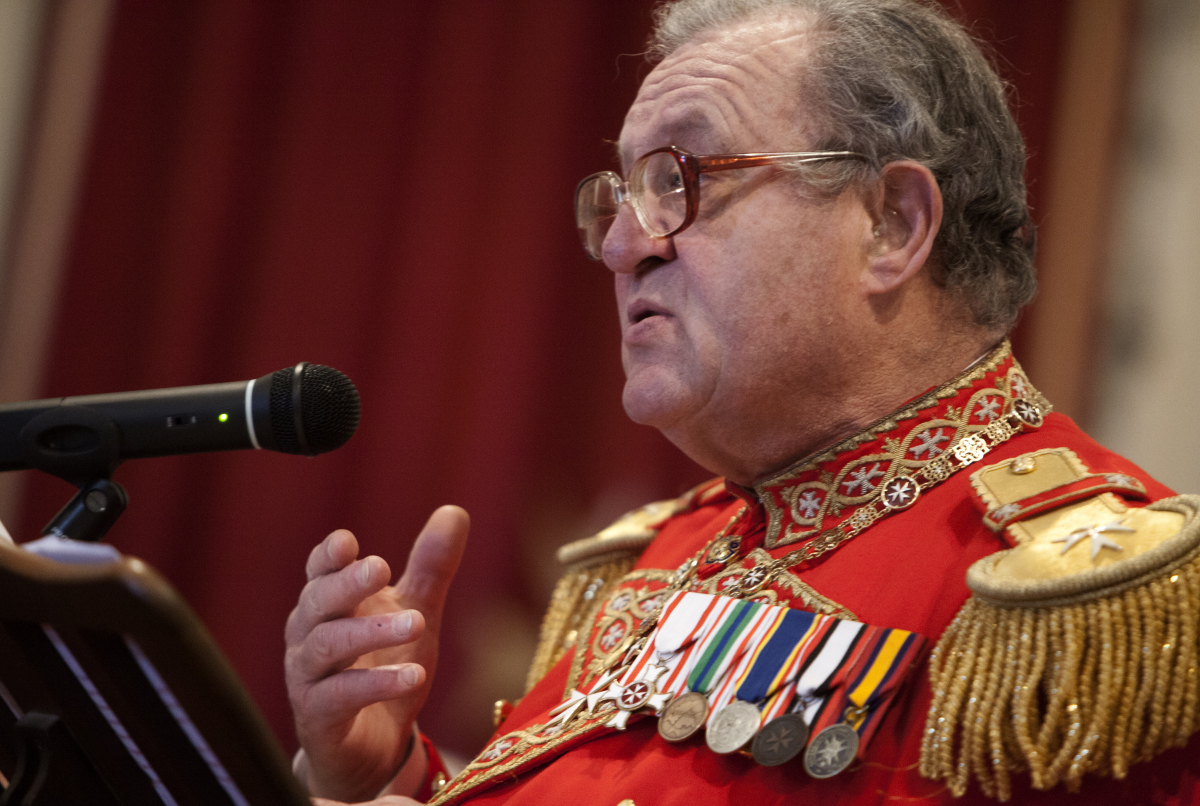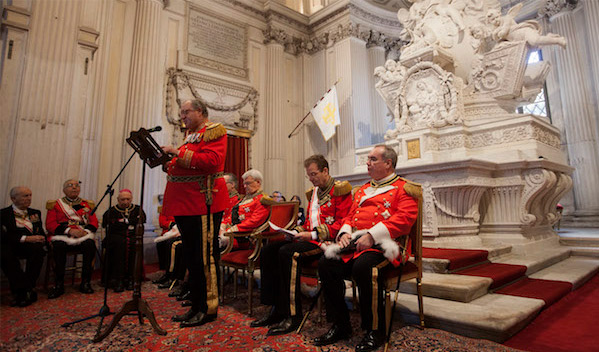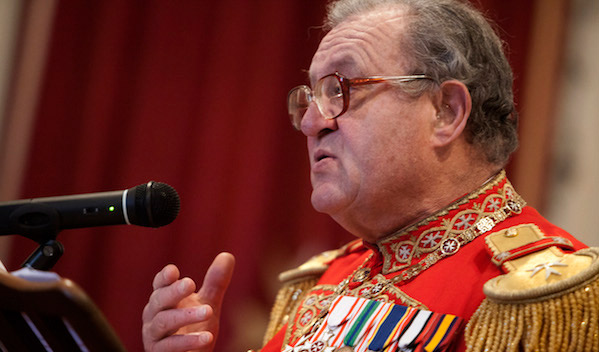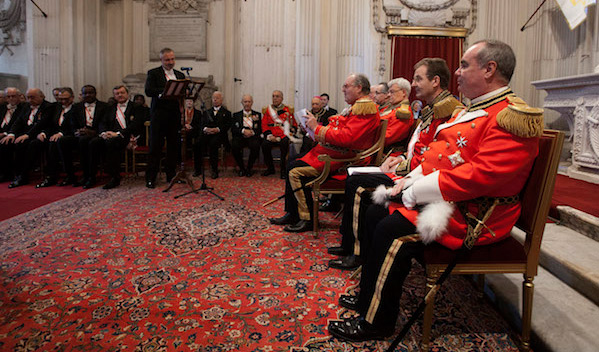The Grand Master Fra’ Matthew Festing received today the Diplomatic Corps accredited to the Sovereign Order of Malta for the traditional audience of the beginning of the new year. The audience took place at the Magistral Villa in Rome.
Here is the address of the Grand Master
Mr Doyen, Excellencies, Ladies and Gentlemen,
The new year has started in the most dramatic and violent circumstances. The deadliest terrorist attack in postwar France, which caused the death of 17 people in Paris, represents a brutal aggression against our fundamental values, against freedom of expression and tolerance.
Moreover, in Nigeria, far from the clamour of the media, 2,000 people are reported to have been killed in a mass attack perpetrated by the militias of Boko Haram, the Islamist movement which earlier last year kidnapped over 250 schoolgirls.
The Sovereign Order of Malta firmly condemns any form of violence, physical, psychological and moral, and strongly reaffirms its commitment against any form of intolerance and violence perpetrated in the name of religion.
Mr Doyen, Excellencies, Ladies and Gentlemen,
I take great pleasure in welcoming you here today for this traditional exchange of good wishes at the beginning of the New Year. I extend a particular greeting to the ambassadors who have recently initiated their valuable work with us. I thank you for the good wishes and the gratifying appreciation expressed for the Order of Malta’s work conveyed by the Doyen on your behalf. I assure you that my gratitude is not formal: in these difficult and often dramatic times, the humanitarian commitment of the Order of Malta has never had such need of support, participation and encouragement.
Helping the suffering is an uphill task and we, as heirs of the ancient Hospitallers, have always known this. At present the road seems even steeper. As we speak 50 million people in the world are fleeing wars, persecutions, poverty and famine. In Syria a whole nation is on the move. The cradle of Christianity is inflamed by sectarian wars: populations live under the constant threat of extremist organizations while the smuggling of migrants and human trafficking businesses have prospered. It’s a bitter paradox that this is happening in an epoch like ours, mindful of the tragic lessons imparted by two world wars, genocides and totalitarianisms. Under the now frayed umbrella of an alleged “global” peace, “local” conflicts are increasingly being accompanied by appalling violence without any moral or conventional limits, a violence that makes no distinction between combatants in uniform and defenceless civilians In the Great War there was a holocaust of soldiers, whereas in today’s regional wars women and children are being sacrificed. In spite of the fundamental rights set down long ago the 21st century is starting out on a slippery slope of new and indiscriminate barbarities. With methods that seem to have regressed to past centuries, the modern fighters in “irregular war” strike without pity at the weakest. The fuel of their hatred is increasingly often religious fanaticism, a distorted ideal that betrays their original faith and acts almost as an anaesthetic on minds and hearts. Our times are tragically scarred by a gradual decay in the application of humanitarian law. The observance of the principles of law come under stress from different sides, as we also see in the resort to military responses that rather than lessening violence, contribute to the rising death toll of civilians and to collateral effects. While these tragedies are acted out, all over the world developed societies are in the grip of what Pope Francis has called the “globalization of indifference”. There is a comfortable sleep of the soul that renders us deaf and insensitive to the pain of our fellow humans in the Middle East or in Africa, on the shores of the Mediterranean or even closer in the outskirts of our cities.
This is the demanding situation in which the Order of Malta is called to respond to the perennial challenge summed up in our motto: tuitio fidei et obsequium pauperum. Our response to this is, as always, twofold:- On one side extreme firmness in defending the dignity of the person and on the other extreme flexibility in adapting to existing circumstances to be close to those in need. While retaining its identity, the Order has never been frightened to change. As in ancient times, knights continue being doctors, nurses, social or humanitarian workers. Of course new therapies and instruments have replaced the old ones but the purpose has remained the same.
The Order of Malta preserves its spiritual vision, shaped by a 1000 year old tradition of fidelity to the Church of Rome. This link broadens the effectiveness of our faith-based humanitarian institution. The Order fully identifies with Pope Francis’ very recent invitation to “get our hands dirty” with the fragility of our fellow creatures in the forgotten outskirts of our world. In the year that has just ended we signed an agreement with the Holy See and the Italian sanctuary of Pompeii for setting up a new soup kitchen in this special place for Marian devotion. The special relations with the Chair of St Peter have recently been confirmed with the appointment of a new Cardinalis Patronus, in the person of Cardinal Raymond Leo Burke. I take this opportunity to convey to our Cardinalis Patronus the respect and admiration already expressed when he took up his high office, and also to repeat our grateful tribute to the five years of commendable work that his predecessor, Cardinal Paolo Sardi, has given us.
Our sovereignty is a guarantee of the authority and autonomy needed to best perform our work. On the world scene our role is that of a “humanitarian institution” that exists and acts to give the poor and marginalized a voice, without hidden agendas or political and economic interests. Our long-standing impartiality gives credit to our intentions, and the trust it manages to inspire ensures that our initiatives are widely appreciated. The network of bilateral relations that you and our ambassadors in over 100 countries are building together year by year is as always a precious support for the effectiveness and efficiency of the aid we give.
The Order of Malta’s foreign policy in 2014 produced important results, for example, the co-operation agreements signed with the Palestinian Government, the Czech Republic and with the International Organization of La Francophonie. Diplomatic relations have also permitted the improvement of health facilities in Cameroon, in particular with regards to mothers and infants, and the development of cooperation agreements aimed at supporting local clinics in El Salvador. Particularly significant is the renewal of the collaboration between the Order of Malta and the Italian Ministry of defence for the Italian Association’s Military Corps in the fields of first-aid, natural disasters and emergencies. This by now long tradition was started just after Italian Unification and has been unfailingly confirmed since.
In 120 countries scattered over five continents, the Order of Malta’s “network” is put to the test through the work of our 59 Priories and National Associations, our 33 relief corps, our international relief agency Malteser International and our thousands of members, doctors and volunteers.
There are the elderly, the physically and mentally disabled, the poor, the lepers, the abandoned children, the single mothers … to describe in detail our operations, as extensive as the universe of human suffering, would be impossible in so little time. I will just cite some significant examples, starting with those involving the greatest humanitarian emergency of our times: migration is certainly one of the most demanding tests. The displaced people of Iraq are migrants, fleeing from IS, the militant Jihadist terrorists who in two years have destroyed centuries of multi-culturalism and peaceful co-existence. In Iraqi Kurdistan, the Order is present with equipment and personnel in mobile clinics run by Malteser International and by local partners. In Turkey, where over 1.7 million Syrian refugees have fled to since 2011, the Order runs a field hospital with specialist doctors and psychologists in active co-operation with the Muslim relief associations. Assistance centres and specialised personnel have been added to our thirty year presence in Lebanon, where around a third of the population now consists of refugees.
Migrants are also those thousands of desperate persons who put their lives in the hands of ruthless human traffickers, setting off in makeshift boats for the “journeys of hope” in the Mediterranean. The numbers speak for themselves, over 130,000 people arrived on the Italian coasts in 2014, with 700% more infants than in the previous year. On the Sicilian island of Lampedusa, as well as on the patrol boats managing the tricky rescues at sea, the specialised personnel of the Order of Malta’s Italian Relief Corps are operating 24 hours a day. Finally, our medical, social and linguistic programmes in France, Belgium, Germany, Spain and Italy are providing significant assistance to immigrants arriving in Europe hoping for a better life. The Order of Malta’s associations provide assistance to people with no legal status helping them with requests for asylum and in dealing with the many administrative procedures.
In need of a safe homeland are also the thousands of persons suffering the conflict of the Gaza Strip, part of that area of the Middle East where our Holy Family maternity hospital in Bethlehem has been for decades a point of reference for all mothers. This beacon of peace in a troubled land is now expanding its activities and outreach programmes providing care and assistance to the women of the nearby villages.
There are also “scourges” that we are fighting, starting with the new insurgence of the Ebola virus, which in West Africa has caused 8,000 victims. We are trying to combat this scourge by sending medicines and equipment to Liberia –and to Guinea Conakry where Ordre de Malte France manages clinics, programmes for early diagnosis and awareness campaigns. Together with them, spread over all Africa, many other specialists wearing the eight-pointed cross have been fighting for years against invisible enemies such as malaria, tuberculosis and HIV/AIDS.
There isn’t only the immediate present to take into account: because after the first aid operation, the problems of social and material reconstruction often remain. This is why our operative “scheme” is to remain in the emergency sites even when the spotlights of the international media have been turned off. We have consolidated this modus operandi in South East Asia shattered by the tsunami of 2004, where in recent years we have concluded our water purification interventions, farmers’ training programmes and microcredit projects. In Haiti, exactly five years after the earthquake that devastated the island, we are continuing our literacy, family assistance and epidemic prevention programmes. Also on Samar and on the other islands of the Philippine archipelago, where a year ago Typhoon Haiyan wreaked pain and death far from the clamour of the media, we are continuing to supply medicines and clothing, to reconstruct buildings and to develop initiatives for increasing family incomes.
Excellencies,
These short and limited observations I wanted to bring to you attention on this occasion do not do justice to the real facts. I am not referring to what we are doing, but to how much there is still to do. A marginalized and distressed humanity forces us all to ask a question about the choices which will define our future:- North and south, the first and the last, wellbeing and squalor, and in the middle the future that we will be capable of building.
Faced with the dimensions of the challenge and the inadequacy of our instruments, Jesus’ warning comes to mind: “The harvest is abundant but the labourers are few” Luke 10:2). With firm conviction, the Order of Malta repeats here with you the pledge to do its part, mobilizing all its potential and looking especially to the younger generation, a promise of new life for the world and also for our longstanding work. We have already taken this route with initiatives such as the Caravan Project for the disabled in Lebanon, which every year involves young European volunteers; or with the final decisions of our Strategic Seminar on Rhodes, which for the next ten years will commit us to adopt strategies for an increasing involvement of young people in the Order’s life. Without reservations or personal prejudices we are reaching out to “new recruits” so that, with their enthusiasm and their willingness to commit themselves unstintingly to others, they will write a new and productive chapter in our long history.
It is precisely this history that once again reminds us that we do not rely only on the generous arms and hearts of our volunteers. Besides personal resources we have institutional resources – the Order’s legal prerogative – to spend to create new links between governments and between cultures, in the name of the higher interests of human development. The felicitous and very recent diplomatic relations established with South Sudan is a demonstration of what sincere diplomacy can create, if directed at people and not against them. On this front I hold out my hand to you especially, professionals of diplomacy and our privileged interlocutors, so that you can help us to help, and so that, in the derelict areas of the world, we can repeat what the ancient chronicles of the Order recount about the hospital created in Jerusalem by our founder, Blessed Gerard: “the poor are sustained and fed, the sick are treated, the sacraments administered, the pilgrims and afflicted refreshed, the illiterate taught, the prisoners redeemed”.
With these sentiments I extend to all of you, to your families and to the nations you represent, my very bests wishes for a busy 2015, rich in spiritual grace.
Fra’ Matthew Festing















